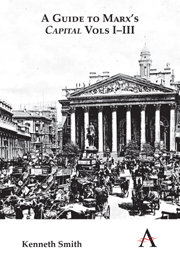Book contents
- Frontmatter
- Contents
- Introduction
- Part I The Development of the Capitalist Mode of Production
- Part II The Capitalist Mode of Production
- Part III The Underdevelopment of the Capitalist Mode of Production
- 10 Mercantilism and the Circuit of Industrial Capital in Capital, Vol. II, Part I, Ch. 1–4
- 11 Credit and the Dissolution of the CMP in Capital, Vol. III, Ch. 27
- 12 Rudolf Hilferding and ‘Finance Capital': Capital, Vol. I, Ch. 25, Section 2
- 13 Marx on Development and Underdevelopment in Capital, Vol. I, Ch. 25, Section 5
- 14 The Tendency of the Rate of Profit to Fall in Capital, Vol. III, Parts I–III, Ch. 1–15, but especially Ch. 14–15
- Part IV The Value Theory of Labour
- Conclusion
- Appendix: On Social Classes
- Notes
- Bibliography
- Index
12 - Rudolf Hilferding and ‘Finance Capital': Capital, Vol. I, Ch. 25, Section 2
from Part III - The Underdevelopment of the Capitalist Mode of Production
Published online by Cambridge University Press: 05 May 2013
- Frontmatter
- Contents
- Introduction
- Part I The Development of the Capitalist Mode of Production
- Part II The Capitalist Mode of Production
- Part III The Underdevelopment of the Capitalist Mode of Production
- 10 Mercantilism and the Circuit of Industrial Capital in Capital, Vol. II, Part I, Ch. 1–4
- 11 Credit and the Dissolution of the CMP in Capital, Vol. III, Ch. 27
- 12 Rudolf Hilferding and ‘Finance Capital': Capital, Vol. I, Ch. 25, Section 2
- 13 Marx on Development and Underdevelopment in Capital, Vol. I, Ch. 25, Section 5
- 14 The Tendency of the Rate of Profit to Fall in Capital, Vol. III, Parts I–III, Ch. 1–15, but especially Ch. 14–15
- Part IV The Value Theory of Labour
- Conclusion
- Appendix: On Social Classes
- Notes
- Bibliography
- Index
Summary
First published in 1910, Rudolf Hilferding's Das Finanzkapital (Finance Capital) was almost immediately hailed as a fourth volume of Marx's Capital.4 In fact, Finance Capital (translated into English in 1981) is less a continuation or an extension of the three volumes of Capital, than an updating and restatement of material covered by Marx, with only a very few exceptions to this general rule (e.g. Hilferding's development of the concept of promoter's profit). In addition to this, Hilferding's restatement of Marx's work is badly flawed in certain major respects; in particular, Hilferding's notoriously poor theory of money (which is admittedly derived from Marx's own confusion on this point)5 and, more seriously, his failure to apply the all important distinction that Marx makes between the concentration and centralization of capital.
However, Finance Capital is of interest to us here for two main reasons. Firstly, because the publication of Hilferding's book had a significant influence on the development of the neo-Marxist theory of imperialism at the beginning of the twentieth century (and especially on Lenin's Imperialism, the Highest Stage of Capitalism, first published in 1916); secondly, because it introduced the highly influential but completely mistaken view that ‘finance capital' was a stage in the development of the capitalist mode of production rather than something that might be better understood as a stage in the development of a highly developed mercantile system.
- Type
- Chapter
- Information
- A Guide to Marx's 'Capital' Vols I-III , pp. 97 - 103Publisher: Anthem PressPrint publication year: 2012



